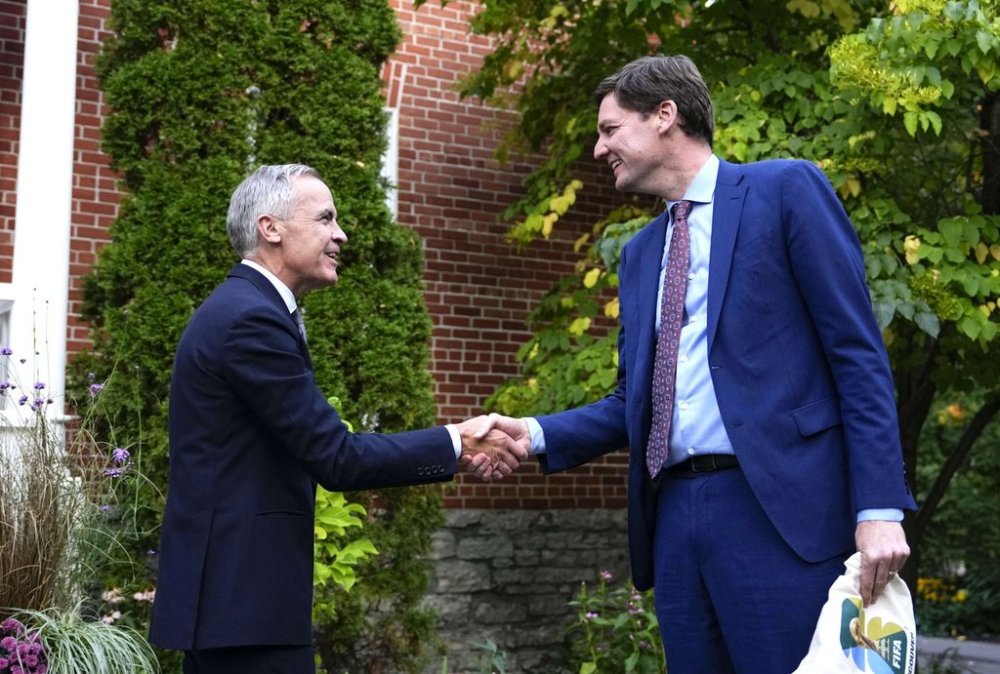Premier Eby tells Carney it’s unacceptable B.C. has been cut out of pipeline talks
Advertisement
Read this article for free:
or
Already have an account? Log in here »
We need your support!
Local journalism needs your support!
As we navigate through unprecedented times, our journalists are working harder than ever to bring you the latest local updates to keep you safe and informed.
Now, more than ever, we need your support.
Starting at $15.99 plus taxes every four weeks you can access your Brandon Sun online and full access to all content as it appears on our website.
Subscribe Nowor call circulation directly at (204) 727-0527.
Your pledge helps to ensure we provide the news that matters most to your community!
To continue reading, please subscribe:
Add Brandon Sun access to your Free Press subscription for only an additional
$1 for the first 4 weeks*
*Your next subscription payment will increase by $1.00 and you will be charged $20.00 plus GST for four weeks. After four weeks, your payment will increase to $24.00 plus GST every four weeks.
Read unlimited articles for free today:
or
Already have an account? Log in here »
VICTORIA – For a project he says “doesn’t actually exist,” there was a lot British Columbia Premier David Eby had to say about a potential pipeline from Alberta to B.C.’s northern coast, in a phone call with Prime Minister Mark Carney on Monday.
There should be a ban on public spending on the project, he said. Or a cap. Or, if it goes ahead with taxpayer money, then B.C. should also get a “$50-billion federally funded project.”
Eby also said he told Carney “how unacceptable” it was for Alberta and Saskatchewan to talk with the federal government about the proposal without input from his province.

“This is not something that would happen to Quebec,” Eby said Monday at an unrelated news conference in Victoria.
“This is not something that would happen to other provinces in the federation. I don’t know why the thought was, that it would be okay for it to happen to British Columbia.”
The federal government and Alberta are said to be finalizing a memorandum of understanding that could include a pipeline, along with exceptions to the ban of tankers off the B.C. coast.
Eby declined to say what steps his government would take to stop such a pipeline, which he has said could threaten thousands of jobs and billions of dollars in “real projects” that depend on a “fragile consensus” with First Nations.
But he said he expects B.C. to fully participate in the conversations, as well as Coastal First Nations, whose consent and support is required.
“We don’t have to agree, but it is absolutely crucial that the perspective, knowledge and relationships of British Columbia are leveraged at that table to make sure that we reach the best conclusion for the people of Canada possible.”
Eby said he was “not threatened by a project that doesn’t actually exist,” and the “entire proposal from (Alberta) Premier (Danielle) Smith is a communications exercise. There is no company. There is no money. There is no route. There’s no nothing.”
Asked about Eby’s complaint about being cut out of talks, Federal Energy Minister Tim Hodgson said Monday that the federal government will be talking to B.C. “in short order.”
Hodgson said the province is the “beneficiary” of having more projects than anywhere else on Ottawa’s list of major projects under consideration for fast-tracking.
Asked if he thought this represented an attempt by Ottawa to soften the blow of a future pipeline, Eby demurred.
“I will let the prime minister speak about the agreement,” Eby said. “The one piece that he underlined for me was that the agreement was not yet finalized at this point, and my expectation, my hope, is that B.C.’s feedback is incorporated into any final agreement, and particularly, B.C.’s participation going forward, and respect for the role of coastal First Nations.”
Eby questioned whether the economics of a pipeline made sense, given the current price of oil. He said he did not foresee any private company paying for the project.
“The reason for their silence is that they are not interested, just like they are not interested in buying the pipeline that we already have that taxpayers own,” Eby said, referring to the Trans Mountain pipeline
Eby said he also told Carney Ottawa should impose a cap on any public funding for the project.
“Or there should be a prohibition on taxpayer dollars invested in this project, or if it is going to be taxpayer-funded, that British Columbia should get access to a $50-billion, federally funded project as well.”
The Hecate Strait between Haida Gwaii and the mainland of British Columbia is an “incredibly precarious” shipping route, Eby said he told Carney.
“It’s the reason why the ban on oil tankers has existed for generations across multiple administrations of different political stripes in Canada, and in British Columbia.”
— With files from Nick Murray in Ottawa
This report by The Canadian Press was first published Nov. 24, 2025.
